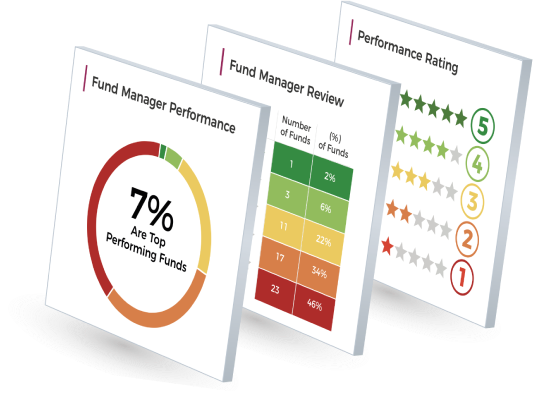- Analysts fear Trump's proposed use of tariffs could impact global markets
- An analysis of Trump's first term as President saw Chinese equities perform at their highest level compared to each of the past 5 Presidential terms despite heightened trade tension.
- Concerns that over reliance on North American equities could increase and impact portfolio diversification, potentially increasing risk for investors.
The return of Donald Trump as U.S President could have significant consequences for investment markets, making portfolio diversification more important than ever for investors.
In this article we identify key concerns and potential opportunities from Trump’s 2nd presidential term. We also highlight the performance of each core market across the past 5 presidential terms and look at why diversification is now more important than ever for UK investors.
The Potential Impact of Trump's Proposed Global Tariffs
Donald Trump is known for his bravado and bold statements, one which he mentioned several times during his election campaign was his proposal to impose worldwide tariffs of 10% to 20% on all imported goods, with a potential 60% tariff on China. Whilst he was likely over exaggerating his tariff plans, such proposals could have far-reaching implications for both U.S. and regional markets globally.
In the U.S. such aggressive tariffs would likely increase costs for companies reliant on imported goods, raw materials, and components, especially in sectors like manufacturing, technology and retail. These added expenses could squeeze corporate profit margins, potentially leading to lower earnings and increased volatility in U.S. equities. Additionally, consumers could see higher prices on goods, potentially dampening spending and economic growth, both of which are critical to equity performance.
For regional markets, the impact could be equally significant, particularly for export-driven economies in Asia and Europe. Countries heavily dependent on U.S. demand may face reduced export volumes as tariffs make their products less competitive in the U.S. market, potentially triggering economic slowdowns and equity market declines in these regions. China, in particular, would be severely impacted by a 60% tariff, which could disrupt major industries and create ripple effects across the Asia-Pacific region. Emerging markets, many of which rely on both U.S. and Chinese demand, could also experience capital outflows as investors seek safer assets amid global trade uncertainty.
While Trump’s statements may be intended to gain leverage in trade negotiations, the possibility of widespread tariffs remains a risk that could disrupt global supply chains, weaken economic growth, and create sustained pressure on equity markets worldwide.
This again increases the importance of strategic diversification for investment portfolios. Anyone with an unbalanced and overweight investment strategy could face enhanced volatility and an increased risk of losses under a Trump presidency.
The $35 Trillion Threat: How U.S. Debt Casts a Shadow on North American Equities
As Trump was re-elected for a 2nd term the U.S S&P 500 experienced a record jump of 2.1% in a day. Already named by some as the ‘Trump bump’, with some analysts believing that the end of the election uncertainty could mark a strong period for North American equity funds and spark an influx of investment into the sector.
However, the end of the election could also bring into focus the enormous debt burden the U.S has amassed. As of November 2024, the U.S. national debt has surpassed $35 trillion, exceeding the nation's GDP and reaching unprecedented levels.
This substantial debt burden heightens the risk of a market downturn for North American equities. High debt levels can lead to increased borrowing costs, as investors demand higher yields to compensate for perceived risks, thereby raising interest rates, which can suppress corporate profits and consumer spending - both critical drivers of equity market performance.
Additionally, significant debt may limit the government's capacity to implement fiscal stimulus during economic slowdowns, potentially exacerbating recessions and negatively impacting investor confidence. Consequently, the substantial U.S. debt poses a considerable threat to the stability and growth of North American equity markets - which is a market many UK investors are already over reliant on.
Now more than ever, investors should think carefully about their portfolio allocation, particularly when considering North American equities or markets that are currently rallying. Overexposure to a single market or region can introduce significant risk, especially if that market becomes subject to policy shifts or economic downturns.
Book A No Obligation Call With A Yodelar Investment Adviser
Sector Performance Over the Past Five U.S. Presidential Terms
An analysis of sector performance over the last five U.S. presidential terms reveals that, despite widespread concerns over tariffs and trade disputes, certain regional equity markets delivered robust returns during Donald Trump’s first term. Chinese equities, for instance, recorded remarkable growth, returning an impressive 100.04% despite an ongoing trade conflict between the U.S. and China. This outperformance highlights the resilience of the Chinese market and underscores the unpredictable nature of regional responses to U.S. policy.

Technology also saw significant gains during Trump’s first term, with the sector achieving returns of 141.64% - far surpassing the current returns seen under the Biden administration.
This contrast emphasises the sector-specific impact of U.S. policy shifts and the importance of a diversified portfolio. While Trump’s policies were often controversial and aimed at specific regions, markets in China and Asia excelled, demonstrating that diversified investments can capture growth even in unexpected areas. For investors, this analysis serves as a powerful reminder of the value in maintaining a balanced, well-diversified portfolio, avoiding overexposure to any single market, and resisting the temptation to chase returns in one sector alone.

Book A Call With An Investment Expert
Importance of Diversification: Growth Opportunities Transcend Politics
Investment markets have a natural ebb and flow, with different regions and industries coming into favour at various times due to changing economic conditions, global trends, and shifting investor sentiment. While presidential policies can influence market direction, the broader dynamics of the global economy mean that no single region or sector dominates indefinitely. For instance, in recent years, technology has driven substantial growth, but other periods have seen sectors like energy, infrastructure, or healthcare take the lead, often due to shifts in demand, innovation, or global circumstances.
Irrespective of who occupies the White House, markets will adapt, and new growth opportunities will continue to emerge across regions and sectors. Historical performance shows that even amid political uncertainty, economies across the world generate resilience and innovation, providing investors with potential returns in diverse areas. Whether it’s the rapid industrialisation in emerging markets, technological advancements, or sectoral growth driven by demographic trends, markets evolve in response to a complex array of factors that extend beyond political leadership.
This again underscores the importance of a diversified approach that captures these varied opportunities, ensuring that portfolios are well-positioned to benefit from growth wherever it may arise.
A diversified approach that considers geographical, sector, and asset class balance can help mitigate these risks. By investing across various regions, the impact of region-specific political or economic events is lessened. In addition, distributing investments across multiple sectors can provide stability, ensuring that downturns in any one area do not disproportionately impact the portfolio.
Many Investors Are Already Overexposed
Yodelar analyse thousands of investment portfolios via our free portfolio analysis service every year and through our analysis process it has become evidently clear that their has been a sharp rise in the proportion of investors (advised and non advised) who are ignoring risk management completely, and simply chasing recent growth sectors, such as North American equities, and tech focused funds, without applying an asset allocation model to their portfolio.
Despite the risks highlighted in this article, we found a growing number of mis-informed investors who are abandoning a diversified asset allocation model in favour of chasing returns and overloading into North America focused funds that have in recent years performed well, ignoring sectors that may not have performed as well recently, but remain critical to maintaining a balanced investment portfolio.
Whether intentional or not, over-concentration has become prevalent in many UK investor portfolios, partly due to advisers over relying on funds with a North American focus, such as many multi-asset or global equity funds. Such funds are often heavily tilted towards North America, thus lacking true global diversification.
Related Article - Why Investors Should Reassess Their North American Exposure
Improve Outcomes With High Quality Advice
By diversifying across various sectors, regions, and asset classes, investors can create a level of insulation from these unpredictable shifts. Spreading investments beyond a single market can help smooth returns and balance risks, allowing portfolios to capture growth in multiple areas while remaining resilient to specific market shocks.
Given these complexities, professional investment advice becomes even more valuable. A skilled adviser can help investors navigate the intricacies of a Trump-led economic environment, recommending strategic adjustments that maintain balance and capture emerging opportunities.
At Yodelar, we have completed over 30,000 portfolio analysis and have witnessed first hand the proclivity for investors to shift the weighting of their portfolio towards asset classes that are currently performing well without the understanding that this will often unbalance their portfolio and increase risk.
Summary
In summary, while the post-election market rally reflects optimism around Trump’s potential policies, investors should proceed with caution. Concentrating too heavily in any single market or asset class can increase exposure to risks associated with policy changes and economic uncertainties. A measured, diversified investment approach grounded in sound analysis of economic fundamentals remains a prudent course for a 2nd Trump term and for navigating the complexities of the financial landscape.

















